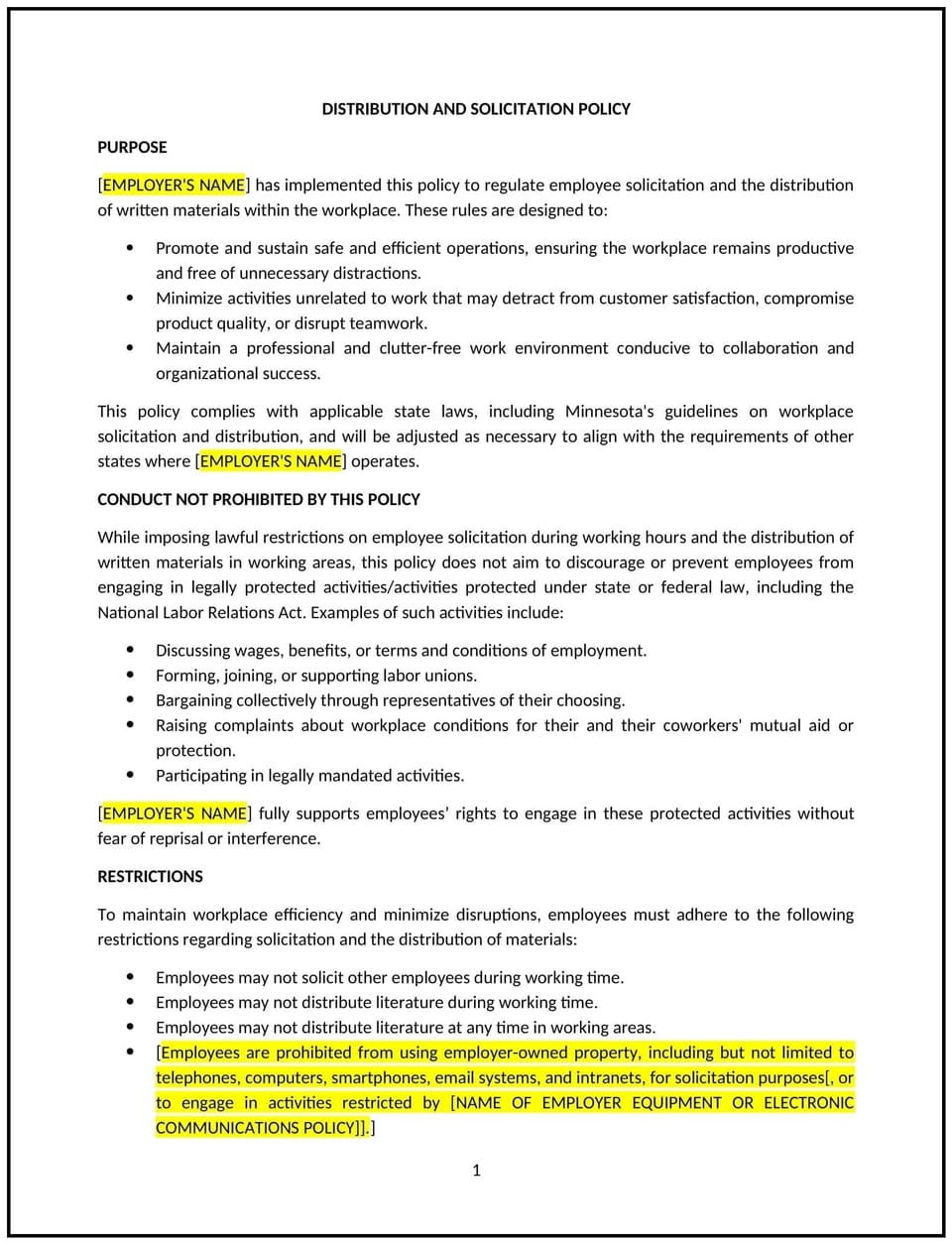Distribution and solicitation policy (Minnesota): Free template

Distribution and solicitation policy (Minnesota)
This distribution and solicitation policy is designed to help Minnesota businesses manage and regulate the distribution of materials and solicitation activities within the workplace or on company property. It outlines guidelines for employees, contractors, and external parties on what types of distribution or solicitation are permitted, ensuring that these activities do not interfere with work or disrupt the workplace environment.
By implementing this policy, businesses can maintain a productive, respectful work environment while controlling outside influences and ensuring fairness in communication practices.
How to use this distribution and solicitation policy (Minnesota)
- Define permissible activities: Specify which types of solicitation and distribution are allowed (e.g., charitable donations, union representation, or internal employee communications) and which are prohibited (e.g., personal sales, non-company-related advertising).
- Establish approval procedures: Outline the process for obtaining approval to solicit or distribute materials within company premises, including submitting requests to management or HR.
- Set times and locations: Determine when and where solicitation or distribution can take place (e.g., during designated breaks or in specific areas like lunchrooms or common areas) to minimize disruptions to work.
- Address employee participation: Clarify that while employees can engage in certain solicitation activities, they must do so in a manner that respects colleagues’ time and space.
- Outline prohibited behaviors: Specify actions that will not be tolerated, such as aggressive solicitation, harassment, or disruptive behavior.
- Address third-party solicitation: Establish guidelines for how third-party vendors, charities, or other external parties can approach employees, including any necessary approval or scheduling.
Benefits of using a distribution and solicitation policy (Minnesota)
Implementing this policy provides several advantages for Minnesota businesses:
- Maintains a professional environment: Ensures that work-related activities are not disrupted by inappropriate solicitation or distribution of materials.
- Promotes fairness: Establishes a clear process for allowing solicitation and distribution in a manner that respects employees' rights and privacy.
- Reduces workplace conflicts: By setting boundaries and expectations, the policy minimizes potential conflicts between employees or between employees and external solicitors.
- Enhances productivity: Prevents disruptive behavior and unnecessary distractions, allowing employees to remain focused on their tasks.
- Reflects Minnesota-specific considerations: Tailors the policy to comply with local laws and community expectations regarding solicitation and distribution activities.
Tips for using this distribution and solicitation policy (Minnesota)
- Communicate clearly: Ensure that all employees are aware of the policy, especially the guidelines for engaging in solicitation and distributing materials on company property.
- Provide training: Offer periodic training or reminders on what constitutes acceptable solicitation and distribution practices within the workplace.
- Monitor adherence: Regularly monitor solicitation and distribution activities to ensure compliance with the policy and address any concerns promptly.
- Create a process for exceptions: Allow for flexibility where appropriate, such as allowing exceptions for charity drives or employee-related initiatives that align with company values.
- Update regularly: Periodically review the policy to ensure it is up to date with any legal changes or evolving company practices in Minnesota.
Q: What types of solicitation and distribution are allowed at the workplace?
A: Businesses should specify acceptable activities, such as charitable donations, employee union representation, or internal announcements, while prohibiting personal sales or advertising unrelated to the company.
Q: How can employees request to distribute materials or solicit contributions at work?
A: Employees should submit a request to management or HR for approval before distributing materials or soliciting contributions, outlining the purpose, timing, and location of the activity.
Q: Are employees allowed to solicit colleagues during work hours?
A: Employees should only engage in solicitation during designated break times or in designated areas that do not disrupt the work environment.
Q: Can third-party organizations solicit or distribute materials at the workplace?
A: Third-party solicitation or distribution may be allowed if approved by management. Businesses should establish clear guidelines and scheduling procedures for third-party activities.
Q: What behaviors are considered inappropriate under this policy?
A: Inappropriate behaviors include aggressive solicitation, pressuring colleagues into making donations, or distributing non-work-related materials in restricted or disruptive areas.
Q: How should businesses handle conflicts arising from solicitation or distribution activities?
A: Businesses should address conflicts promptly by mediating between the involved parties and reminding employees of the policy guidelines to ensure a fair and respectful resolution.
Q: How often should this policy be reviewed?
A: The policy should be reviewed annually or when there are changes to local laws, workplace practices, or Minnesota-specific guidelines regarding solicitation and distribution activities.
This article contains general legal information and does not contain legal advice. Cobrief is not a law firm or a substitute for an attorney or law firm. The law is complex and changes often. For legal advice, please ask a lawyer.


